
Ryland Peter Cooder is an American musician, songwriter, film score composer, record producer, and writer. He is a multi-instrumentalist but is best known for his slide guitar work, his interest in traditional music, and his collaborations with traditional musicians from many countries.
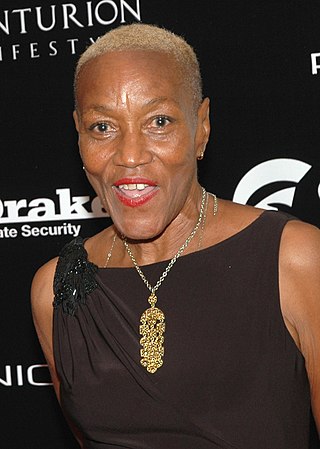
Gloria Richetta Jones is an American singer and songwriter who first found success in the United Kingdom, being recognized there as "The Queen of Northern Soul". She recorded the 1965 hit song "Tainted Love" and has worked in multiple genres as a Motown songwriter and recording artist, backing vocalist, and as a performer in musicals such as Hair. In the 1970s, she was a keyboardist and vocalist in Marc Bolan's glam rock band T. Rex. She and Bolan were also in a committed romantic relationship and had a son, Rolan Bolan, together.

Buffy Sainte-Marie, is an Indigenous Canadian-American singer-songwriter, musician, composer, visual artist, educator, pacifist, and social activist. While working in these areas, her work has focused on issues facing Indigenous peoples of the Americas. Her singing and writing repertoire also includes subjects of love, war, religion, and mysticism. She has won recognition, awards and honours for her music as well as her work in education and social activism. Among her most popular songs are "Universal Soldier", "Cod'ine", "Until It's Time for You to Go", "Take My Hand for a While", "Now That the Buffalo's Gone", and her versions of Mickey Newbury's "Mister Can't You See" and Joni Mitchell's "The Circle Game". Her songs have been recorded by many artists including Donovan, Joe Cocker, Jennifer Warnes, Janis Joplin, Elvis Presley, and Glen Campbell.

Gerald Goffin was an American lyricist. Collaborating initially with his first wife, Carole King, he co-wrote many international pop hits of the early and mid-1960s, including the US No.1 hits "Will You Love Me Tomorrow", "Take Good Care of My Baby", "The Loco-Motion", and "Go Away Little Girl". It was later said of Goffin that his gift was "to find words that expressed what many young people were feeling but were unable to articulate."

Crazy Horse is an American rock band best known for their association with Neil Young. Beginning in 1969 and continuing to the present day, they have been co-credited on a number of Young's albums, with 15 studio albums and numerous live albums being billed as by Neil Young and Crazy Horse. They have also released six studio albums of their own, issued between 1971 and 2009.

Neil Young is the debut studio album by Canadian / American musician Neil Young following his departure from Buffalo Springfield in 1968, issued on Reprise Records, catalogue number RS 6317. The album was first released on November 12th 1968 in the so-called 'CSG mix'. It was then partially remixed and re-released in late summer 1969, but at no time has the album ever charted on the Billboard 200.
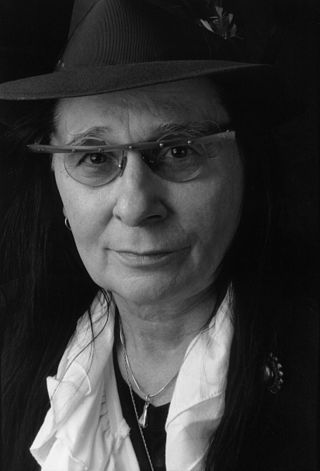
Bernard Alfred "Jack" Nitzsche was an American musician, arranger, songwriter, composer, and record producer. He first came to prominence in the early 1960s as the right-hand-man of producer Phil Spector, and went on to work with the Rolling Stones and Neil Young, among others. He also worked extensively in film scores, notably for the films Performance, The Exorcist and One Flew Over the Cuckoo's Nest. In 1983, he won the Academy Award for Best Original Song for co-writing "Up Where We Belong" with Buffy Sainte-Marie.
Russ Titelman is an American record producer and songwriter. He has to date won three Grammy Awards. He earned his first producing the Steve Winwood song "Higher Love", and his second and third for Eric Clapton's Journeyman and Unplugged albums, respectively. Titelman also produced Clapton's 24 Nights live album of 1990 and the all-blues album From the Cradle, released in 1994.
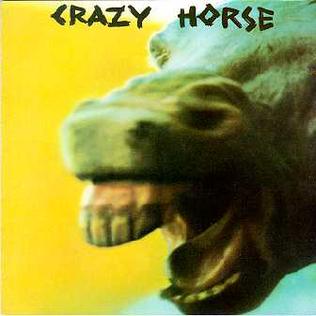
Crazy Horse is the debut album by Crazy Horse, released in 1971 by Reprise Records. It is the only album by the band to feature Danny Whitten recorded without Neil Young, and it peaked at #84 on the Billboard 200 album chart.

Neil Young Archives Vol. 1: 1963–1972 is the first in a planned series of box sets of archival material by Canadian-American musician Neil Young. It was released on June 2, 2009, in three different formats - a set of 10 Blu-ray discs in order to present high resolution audio as well as accompanying visual documentation, a set of 10 DVDs and a more basic 8-CD set. Covering Young's early years with The Squires and Buffalo Springfield, it also includes various demos, outtakes and alternate versions of songs from his albums Neil Young, Everybody Knows This Is Nowhere, After the Gold Rush, and Harvest, as well as tracks he recorded with Crazy Horse and Crosby, Stills, Nash & Young during this time. Also included in the set are several live discs, as well as a copy of the long out-of-print film Journey Through the Past, directed by Young in the early 1970s.

The Ducks were a short-lived American rock group formed in the summer of 1977 by singer-songwriter Jeff Blackburn. The band included Bob Mosley, Canadian singer-songwriter Neil Young, and Johnny Craviotto. The band played a series of impromptu bar gigs around the Santa Cruz area in 1977.

Performance is a 1970 soundtrack album to the film Performance by Donald Cammell and Nicolas Roeg. It features music from Randy Newman, Merry Clayton, Ry Cooder, Jack Nitzsche, Buffy Sainte-Marie, The Last Poets and Mick Jagger.

I'm Gonna Be a Country Girl Again is the fifth album by Cree singer/songwriter Buffy Sainte-Marie. As its title suggested, it saw her embrace Nashville country music with the help of session veterans such as the Jordanaires, Grady Martin, Roy M. Huskey, Jr. and Floyd Cramer. The album included re-recordings of "Now That the Buffalo's Gone" and "The Piney Wood Hills" from her first and second albums respectively. "Tall Trees in Georgia", in contrast to most of the material, showed Sainte-Marie performing in a style reminiscent of her earliest work.

Illuminations is the sixth album by Indigenous Canadian-American singer Buffy Sainte-Marie, released in 1969 on Vanguard Records. From a foundation of vocals and acoustic guitar, Sainte-Marie and producer Maynard Solomon made pioneering use of the Buchla 100 synthesizer to create electronically treated vocals. It was the first quadraphonic vocal album released. The album's only single was "Better to Find Out for Yourself".
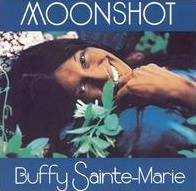
Moonshot is a studio album by Canadian singer-songwriter Buffy Sainte-Marie, released in 1972 by Vanguard Records.
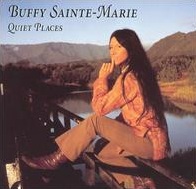
Quiet Places is Buffy Sainte-Marie's ninth album and her last for Vanguard Records, with whom she had had a very strained relationship ever since the financial disaster of the experimental Illuminations. In fact, her next album, Buffy, had already been recorded before Quiet Places was actually released and was not to find a label for many months after she had completely broken with Vanguard.
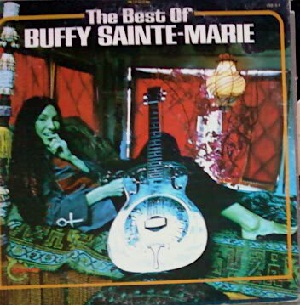
The Best of Buffy Sainte-Marie is a compilation album taken from her first six albums with Vanguard Records, released in 1970.
"Cod'ine" is a contemporary folk song by singer-songwriter Buffy Sainte-Marie. Considered one of the earliest anti-drug songs, Sainte-Marie wrote the piece after becoming addicted to codeine which she had been given for a bronchial infection. She recorded it for her debut album, It's My Way! (1964).

"Smackwater Jack" is a song written by Gerry Goffin and Carole King. It was first released on King's 1971 album Tapestry and then on the second single from that album, along with "So Far Away", charting at number 14 on the Billboard Hot 100. It was subsequently covered by many artists, most famously by Quincy Jones as the title song of his 1971 album Smackwater Jack.
"The Circle Game" is a song by Canadian singer-songwriter Joni Mitchell composed in 1966. One of her most-covered songs, it was originally recorded by Ian & Sylvia and Buffy Sainte-Marie in 1967, and by Tom Rush for his 1968 album of the same name. Mitchell recorded it for her 1970 album Ladies of the Canyon; it also appears on her album Miles of Aisles.

















